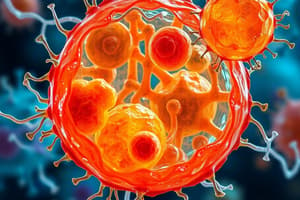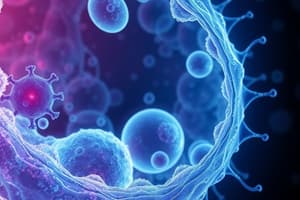Podcast
Questions and Answers
What is the first principle of cell theory?
What is the first principle of cell theory?
- A cell is the structural and functional unit of all living things
- Cells contain hereditary information (DNA) which is passed on to new cells during cell division
- All living organisms are made of cells (correct)
- All cells come from pre-existing cells by division
Which scientist stated that all animal tissues are composed of cells?
Which scientist stated that all animal tissues are composed of cells?
- Theodor Schwann
- Matthias Schleiden
- Anton van Leeuwenhoek
- Rudolf Virchow (correct)
Which type of cells consist of organisms in the domains Bacteria and Archaea?
Which type of cells consist of organisms in the domains Bacteria and Archaea?
- Plant cells
- Animal cells
- Eukaryotic cells
- Prokaryotic cells (correct)
Who discovered cells in a piece of cork in 1838?
Who discovered cells in a piece of cork in 1838?
What is the structural and functional unit of all living things?
What is the structural and functional unit of all living things?
Which scientist first observed and described magnified living things by a simple microscope?
Which scientist first observed and described magnified living things by a simple microscope?
Which of the following is a characteristic of all cells?
Which of the following is a characteristic of all cells?
What distinguishes the genetic material of prokaryotic and eukaryotic cells?
What distinguishes the genetic material of prokaryotic and eukaryotic cells?
In which type of cell does cellular respiration occur in mesosomes?
In which type of cell does cellular respiration occur in mesosomes?
What is a common feature of the genetic material in prokaryotic and eukaryotic cells?
What is a common feature of the genetic material in prokaryotic and eukaryotic cells?
What is the main difference in cell division between prokaryotic and eukaryotic cells?
What is the main difference in cell division between prokaryotic and eukaryotic cells?
Which type of cell contains membrane-bound organelles?
Which type of cell contains membrane-bound organelles?
What is a characteristic of the genetic material in prokaryotic cells?
What is a characteristic of the genetic material in prokaryotic cells?
Where does cellular respiration occur in eukaryotic cells?
Where does cellular respiration occur in eukaryotic cells?
What distinguishes the cell wall composition of prokaryotic and eukaryotic cells?
What distinguishes the cell wall composition of prokaryotic and eukaryotic cells?
What is a unique feature of flagella in eukaryotic cells?
What is a unique feature of flagella in eukaryotic cells?
Study Notes
Cell Theory
- The first principle of cell theory states that all living organisms are composed of one or more cells.
Cell Composition
- All animal tissues are composed of cells, as stated by Theodor Schwann.
Types of Cells
- Cells that consist of organisms in the domains Bacteria and Archaea are prokaryotic cells.
Discovery of Cells
- In 1838, Matthias Jakob Schleiden discovered cells in a piece of cork.
Structural and Functional Unit
- Cells are the structural and functional unit of all living things.
Microscopy
- Antonie van Leeuwenhoek was the first to observe and describe magnified living things using a simple microscope.
Cell Characteristics
- A characteristic of all cells is that they are the basic units of life.
Genetic Material
- The genetic material of prokaryotic cells is not membrane-bound, distinguishing it from eukaryotic cells.
- The genetic material in prokaryotic cells is a single circular chromosome.
- A common feature of the genetic material in prokaryotic and eukaryotic cells is that it is made up of DNA.
Cellular Respiration
- In prokaryotic cells, cellular respiration occurs in mesosomes.
- In eukaryotic cells, cellular respiration occurs in mitochondria.
Cell Division
- The main difference in cell division between prokaryotic and eukaryotic cells is that prokaryotes undergo binary fission, while eukaryotes undergo mitosis and meiosis.
Cell Structure
- Eukaryotic cells contain membrane-bound organelles.
- The cell wall composition of eukaryotic cells is typically composed of cellulose, distinguishing it from prokaryotic cells which have peptidoglycan cell walls.
- Flagella in eukaryotic cells are unique in that they are composed of microtubules and are larger than prokaryotic flagella.
Studying That Suits You
Use AI to generate personalized quizzes and flashcards to suit your learning preferences.
Description
Test your knowledge on cell structure, functions, and the principles of cell theory with this quiz covering the content from Chapter 2 of Biology. Explore topics such as prokaryotic and eukaryotic cells, cell theory, and the importance of cell structure and functions.



